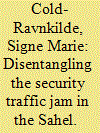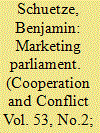|
|
|
Sort Order |
|
|
|
Items / Page
|
|
|
|
|
|
|
| Srl | Item |
| 1 |
ID:
172869


|
|
|
|
|
| Summary/Abstract |
Despite years of ongoing interventions by multiple external and regional actors, the security situation in west Africa's Sahel region is dramatically deteriorating. In this introduction to the special section of the July 2020 issue of International Affairs, we zoom in on four major external international intervention actors (France, the United States, the European Union and the United Nations) in the Sahel region's escalating ‘security traffic jam’. We argue that the diversity of intervention actors makes the Sahel a paradigmatic case for exploring a set of often-overlooked constitutive intervention effects. By adding new temporal, relational and spatial dimensions to the notion of ‘constitutive effects’ as introduced by post-structuralists in the 1990s, we (re)launch constitutive effects as a conceptual framework for approaching the study of ongoing intervention engagements. From this perspective, and as further illustrated in this special section, intervention continuity and escalation cannot be explained simply with reference to frameworks of ‘success’ or ‘failure’, but require a broader conceptualization of effects, including how specific threat perceptions, rationales and problematizations get constituted and consolidated through and during ongoing intervention practice. Contributions to this special section each unpack a diverse set of constitutive effects including the contested performance of security actorness, the (un)making of security alliances and partnerships, logics of choices produced by ongoing intervention practices, as well as the constitution of conditions for continual international involvement.
|
|
|
|
|
|
|
|
|
|
|
|
|
|
|
|
| 2 |
ID:
159967


|
|
|
|
|
| Summary/Abstract |
The Jordanian parliament is widely recognised as a patronage provider and means for authoritarian upgrading. Despite, or precisely because of this, it has over the past years become a linchpin of US and European attempts at parliamentary strengthening. The parliament’s highly marginalised position notwithstanding, this article suggests that such efforts provide us with an insightful opportunity to better understand the reconfiguration of authoritarian power via external intervention in the name of democracy. Discussing the contradictory effects of parliamentary strengthening programmes in Jordan, the article tries to shift the discussion of democracy promotion away from a concern with policy, conceptual debates and intentions to one with democracy promotion’s constitutive effects. As such, the article investigates the framing of Jordanian politics within a market rationale as central mechanism for the de-politicisation of uneven power relations. Further, it explores the ways in which democracy promotion serves to seemingly reconfirm interveners’ desired self-understandings via the maintenance of assumptions of cultural ‘difference’. Ultimately, it is suggested that decentring the study of democracy promotion by paying more attention to its constitutive effects provides us with a better understanding of why and how increasing democracy promotion portfolios have, in Jordan, had the effect of strengthening authoritarianism.
|
|
|
|
|
|
|
|
|
|
|
|
|
|
|
|
|
|
|
|
|